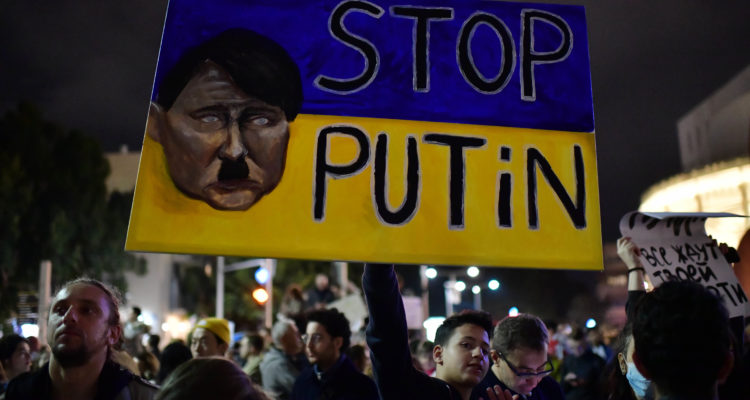“Nothing new came up in the meeting” with the Israeli prime minister, Zelensky’s media adviser said.
By Batya Jerenberg, World Israel News
Prime Minister Naftali Bennett told the weekly Cabinet meeting Sunday that it was his “moral obligation” to attempt to mediate between the warring sides in Ukraine by meeting over the Sabbath in Moscow with the Russian president.
In a tacit acknowledgement that his three-hour discussion with President Vladimir Putin has not paused the Russian offensive, he said, “Even if the chance is not great — as soon as there is even a small opening, and we have access to all sides and the capability — I see this as our moral obligation to make every effort.
“As long as the candle is burning, we must make an effort and perhaps it will yet be possible to act. We will continue to assist as needed.”
Bennett said that the nature of his talks precluded going into detail. According to Ukrainian Prime Minister Volodymyr Zelensky’s media adviser, however, “nothing new had come up in the meeting.”
Bennett spoke with Zelensky, who has been urging Israel to get involved diplomatically for days, both before and after meeting with Putin.
He also spoke with French President Emmanuel Macron afterward and tflew to Berlin straight from Russia for a 90-minute meeting with German Chancellor Olaf Scholz.
Bennett made a point of saying that he had gone to Moscow “with the blessing and encouragement of all players” in the arena. This included the United States, one Israeli source told Ynet, although it was previously reported that the White House was skeptical that there was anything the prime minister could say to influence Putin to end the invasion.
Communications Minister Yoaz Handel praised Bennett’s trip, which is ordinarily religiously forbidden on the Jewish Sabbath.
“Every Jew and Zionist is very proud that the Israeli prime minister is making every effort to make peace in the world in order to save [it from] bloodshed,” he said.
Saving a life takes precedence over almost every commandment, including fulfilling the laws of the day of rest.
Bennett was the first Western leader to meet with Putin since Russia’s invasion 10 days ago.
Noting that “the human suffering is great and is liable to be much greater,” Bennett added Israel is preparing for “a significant wave of immigration as a result of the situation” in Ukraine, as thousands of Jews are fleeing the war-torn country over the borders of five neighboring countries – Poland, Hungary, Moldova, Slovakia and Romania.
“This is a challenge for the State of Israel but it is a challenge we have met in the past, time and again,” he added. “At such moments, when the world is facing turmoil and Jews are no longer safe where they are, everyone is reminded how important it is that there is a home for Jews wherever they are; how important it is that we have the State of Israel.”
Immigration and Absorption Minister Pnina Tamano-Shata said before the Cabinet meeting that “we are working to provide the best conditions for the Jewish refugees and those entitled under the Law of Return who come to Israel. We have instructed that we aren’t asking them to come with [immigrant] visas.”
For now, the refugees who land atn Ben Gurion Airport are given food and drink and brought to hotels, she added, while “the massive and primary absorption will be long-term and that is what we are working on these days. I expect tens of thousands of Jews to come to Israel in the coming months.
Interior Minister Ayelet Shaked told the Cabinet that to date, just over 2,000 refugees from Ukraine have arrived on various flights, mainly from Poland and Moldova. She noted that 90% of them are not entitled to become citizens under Israel’s Law of Return, which is for people with at least one Jewish grandparent or those married to Jews.




